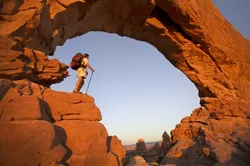If you’re considering a National Parks family vacation this summer, here’s another reason to celebrate the Great American Resource.

America’s national parks are champions of sustainability. They not only talk the talk, they walk the walk — literally, as in the case of new boardwalks made from recycled plastic lumber at Cape Cod National Seashore; and figuratively such as at Canyonlands National Park in Utah, a remote, off-the-grid locale where staff compete to see who can use the least water (which costs about $700 per load to be trucked in). National Parks Service initiatives in sustainability go way beyond the standard recycling and conservation efforts:
Going to the dogs at Denali: Denali National Park and Preserve in Alaska has the park system’s only team of working sled dogs. While the dogs earn their keep by helping rangers conduct winter patrols, among other jobs, they do tend to leave their mark, so to speak. Twenty-five pounds of it per day! The park has responded by composting the dogs’ waste and using it for landscaping. But the dogs were leaving behind more than just waste. Brushing the dogs was producing volumes of fur. It was decided that the fur would be saved and given to local artisans to spin, dye and knit; craftspeople have been creating hats, ear bands and other warm-weather gear.
Milking the opportunity at Shelburne Farms: The entire mission of Shelburne Farms, Vermont, a 1,400-acre working farm and national historic landmark, is to cultivate a conservation ethic. It does this in a number of ways, including raising cattle using environmentally friendly rotational grazing. These cows provide the milk needed to produce an award-winning farmhouse cheddar. To further deliver their message of farm to table, Shelburne Farms works with schools in Burlington, Vermont, to buy local, organically raised food for school lunches though partnerships with area farmers. The food, including milk and cheese from Shelburne, is delivered to the schools and the concept is included in curriculum.
Earth-friendly refuge at Zion: Anyone seeking a refuge offering peace and comfort need look no further than Zion National Park. From its organic food offerings at in the Zion Lodge, to composting, nontoxic cleaning agents and energy-efficient cabins, this is one park that’s greener than green. Zion is so excited about its commitment to sustainability that visitors are offered encouragement, interpretive programs and workshops to learn how to follow the park’s lead. There are also some great kids’ programs set in the massive canyon walls of Utah.
The bus stops here: While visitors to Yosemite National Park in California might notice that the shuttle buses are quieter and have larger, light-sensitive windows to better view the park’s spectacular scenery, it’s what they won’t notice that has park staff excited. Yosemite recently scrapped its fleet of a dozen diesel-only buses and replaced them with new hybrid electric technology. It’s expected the new buses will reduce noise pollution from accelerating and decelerating by as much as 70 percent, and reduce particulate, hydrocarbon and carbon monoxide emissions by up to 90 percent. They’ll also last longer and will require far fewer oil changes than the traditional shuttles.
Food for positive thought: Thanks to various sustainable cuisine experts, National Park Services’ concessions offer environmentally friendly food service. From wine made with organically grown grapes to beef raised using sustainable practices and without growth hormones or antibiotics, from fair-trade certified coffee to locally grown produce, you’ll find something to suit your palate — and your conscience.
For info on any of the national parks, visit www.nps.gov.
LESLIE GARRETT is a mother of three and author of the new book, “The Virtuous Consumer: Your Essential Shopping Guide to a Better, Kinder, Healthier Planet (and one our kids will thank us for!)”.




















